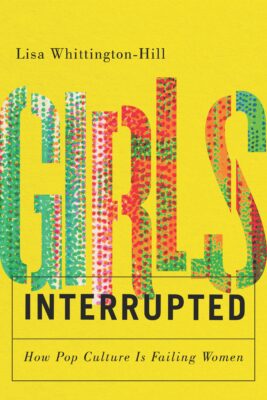Have women ever been taken seriously by pop culture?
As a culture writer who has covered the subject extensively for the past three years, my answer is an immediate no. Pop culture has an issue with women. In a recent interview for the New York Times, Jann Wenner, founder of Rolling Stone magazine, justified the lack of women interviewed for his book because “none of them were as articulate enough on this intellectual level.”

Girls Interrupted
How Pop Culture Is Failing Women
Lisa Whittington-Hill
Véhicule Press
$24.95
paper
200pp
9781550656329
Whittington-Hill came of age during the ’90s, a golden age of music and culture in general, noticing misogyny in the music industry firsthand. In Girls Interrupted, her experiences and observations are corroborated by studies and experts in the field, making her essays stronger and more enjoyable. She gets right to the point in the first pages, reporting on double standards in the industry and claiming that even if #MeToo and #TimesUp have given an “impression that things are better for women now,” they are far from it. “This book exists to prove otherwise,” she confidently states, as if declaring her essays as works of activism. And while they are all beautifully written and essential to read, the pieces have one flaw: they do not explore any new angle. We read them, agreeing with Whittington-Hill, who states well-documented facts but doesn’t bring much new to the conversation.
Nonetheless, this doesn’t lower the reporting or writing quality. Girls Interrupted is an excellent read for anyone interested in modern-day feminism and pop culture’s shortcomings regarding women. While Whittington-Hill’s penchant for the ’90s grunge scene and Courtney Love – whom she mentions multiple times in the book – does take up a rather substantial part of the book, she still manages to write about modern pop culture events. One of her best essays, “Girls Gone Grift,” explores the media obsession with female grifters. Taking the examples of Anna Sorokin (Anna Delvey) and Elizabeth Holmes, she dives deep into how these women were treated compared to male grifters, such as Fyre Festival founder Billy McFarland. According to Whittington-Hill, female grifters’ stories are “stories about how we love to see women fail.” She compares the lexicon used for men (“disruptors” instead of criminals) to the one used for women (“wannabe socialites”). The truth is that these are details that I was aware of but never paid great attention to – Whittington-Hill peels back the veil on subjects we subconsciously dismiss or file away as obvious and therefore not worth analyzing.
Whittington-Hill knows what she is talking about, but her best writing in this collection is when she shares her own experience. Suffering from Obsessive Compulsive Disorder, she opens up in “OCD is Not a Joke,” describing her struggles with her rituals and how she finally felt accurately portrayed on television by shows like Girls, for example. Her emotions are easily conveyed to the reader, making her story more relatable and authentic. In this piece, the writer is at her finest. She makes us ask for more. She talks about this again in “Money Shots,” but fails to achieve the same effect – despite infusing the piece with her thoughts, she doesn’t bring anything new to the table. We already know where she’s going: Yes, the media have described mental health negatively. Yes, women are again being treated badly by the press. While it is important to talk about these events, bringing new perspectives would have been appreciated.
In spite of my reservations, Whittington-Hill is a skilled culture writer and shows it in every page. While it lacks new perspectives on the subject, Girls Interrupted is an obligatory read for anyone who wants to make a career in culture. Because for culture to be a safe space, everyone needs to be treated equally. And, as Whittington-Hill repeatedly emphasizes, this is unfortunately far from being the case.mRb






0 Comments